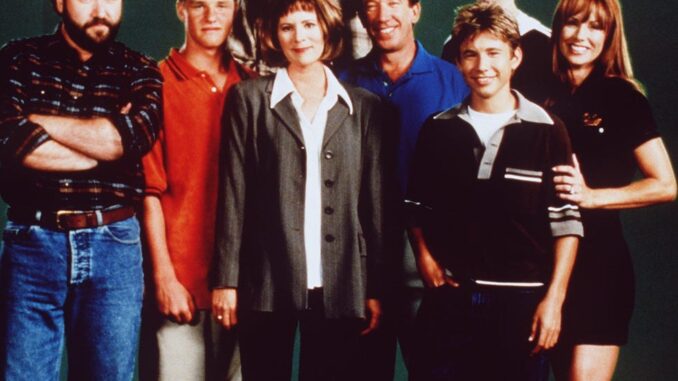
The Ghost of Binford: What Tim Allen Really Thinks About Bringing Back Home Improvement
The very notion of resurrecting Home Improvement sends a nostalgic tremor through the collective memory of a generation. For many, the show was the quintessential 90s sitcom, a comforting blend of family mishaps, suburban shenanigans, and the ever-present roar of Tim "The Tool Man" Taylor's over-powered machinery. But to imagine what Tim Allen, the man who embodied that iconic character, truly thinks about a revival is to delve into a complex workshop of pragmatism, legacy, and perhaps, a touch of wistful sentiment. It’s less about a simple yes or no, and more about the hum and clatter of gears turning, considering every angle with the precision of a seasoned craftsman.
First, there’s the undeniable pull of legacy. Home Improvement isn't just a show; it's a cultural touchstone. It launched Allen into superstardom, cemented his persona as the gruff but lovable everyman, and defined an era of family-friendly television. For an actor, such a signature role is both a blessing and a heavy toolbelt. It’s the character people associate with him, the well-worn flannel shirt he can slip into effortlessly. A part of Allen, the stand-up comedian and the showman, understands the immense power of that nostalgia, the immediate connection he could re-establish with millions of viewers. He’d hear the collective cheer, the whispered "Argh, argh, argh" from the crowd, and a flicker of the old Tool Man magic would undoubtedly ignite within him.
Yet, this appreciation for legacy is fiercely guarded. Tim Allen is a man who values authenticity and, one suspects, an almost blue-collar work ethic when it comes to his craft. He knows that lightning rarely strikes twice in the exact same spot. The magic of Home Improvement wasn't just in the gags; it was in the organic chemistry of the cast, the innocence of the era, and the universal relatability of a dad trying (and often failing) to wrangle his family and his tools. To bring it back would mean confronting the specter of "more power" applied to a well-oiled machine that could, ironically, break under the strain of forced resurrection. He’s likely considered the risk of tarnishing a beloved memory with something that feels… off-key. The ghost of Binford, a company built on a specific kind of American dream, wouldn't want a shoddy, rushed job.
Then there's the profound, unfillable void left by the passing of Earl Hindman, the man behind the fence, Wilson W. Wilson. Wilson wasn't just a neighbor; he was Tim's conscience, his sounding board, his philosophical counterpoint. His obscured face and gentle wisdom were as integral to the show's heart as Tim's grunts and explosions. To revive the show without Wilson would be like building a beautiful house but forgetting the foundation. Allen, who has spoken warmly of Hindman, would likely feel this absence acutely. How do you replace that unique, off-kilter dynamic? You simply can't. And a show that attempts to would be forever battling that emotional deficit.
Furthermore, Allen has already explored much of this territory with Last Man Standing, a successful sitcom that, while distinct, certainly shared thematic DNA with Home Improvement: a conservative, family-oriented male navigating a changing world. He's had his modern-day iteration of the "Tim Taylor" archetype. Does he have anything truly new to say within the Home Improvement universe that he hasn't already said, or that couldn't be said more effectively in a fresh context? He's too savvy a performer to simply rehash old jokes or rely solely on nostalgia as a crutch. He’d demand a compelling reason, a fresh angle, beyond just a paycheck.
So, what does Tim Allen really think? It's not a simple desire for a reboot, nor is it an outright rejection. It's a contemplative, almost weary assessment. He sees the dollars, sure. He hears the fans, absolutely. But he also sees the immense challenges: the irreplaceable cast members, the shifting cultural landscape, the danger of diminishing a cherished legacy, and the question of genuine artistic motivation versus commercial expediency.
In his mind, there’s likely a quiet pride in what Home Improvement achieved, a satisfaction that it remains a fond memory for so many. And perhaps, that’s exactly where it should stay. He might occasionally walk past a buzzing circular saw, or catch the scent of sawdust, and a flicker of the Tool Man might briefly ignite. But the deeper, more pragmatic thought is probably that some things, like a perfectly tuned engine, are best admired for their original glory, running smoothly in the annals of television history, rather than being disassembled and reassembled in hopes of recapturing a unique, unrepeatable roar. The wisdom of Wilson, perhaps, would have been to leave well enough alone. And Tim Allen, the man who built an empire on "more power," likely understands the power of knowing when to lay down the tools.